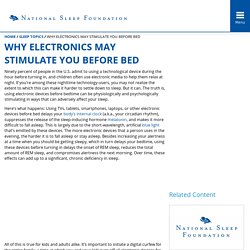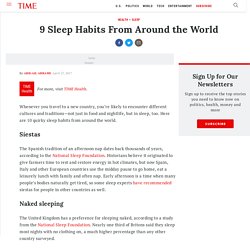

Do you sleep like a baby? Plans / Features Help Sign Up Login Sign Up (free) Dashboard Pricing Guides and Help How to Guide Contact Sign Out Sign Up Login Manage existing quizzes, Custom Templates, Better Security, Data Exports and much more Get Started Sign inSign in with Facebook Sign inSign in with Google. Sleep for the Mind and Body. What is Sleep Hygiene? While the word “hygiene” conjures up images of hand-washing and teeth-brushing, sleep hygiene is different.

It’s the habits that you can put in place each evening to optimize sleep. Don’t worry—it doesn’t take much effort. Just a few simple changes can make the difference between a good night’s sleep and night spent tossing and turning. Create a Zen Bedroom Learn how to set the right scene, so your space is peaceful and calm. Get earplugs or a sound conditioner: Extraneous noise in the bedroom can disrupt your sleep; use whatever you need to create a quiet environment.
Adjust Your Lifestyle. How to Design a Nighttime Routine. Establishing a pre-bedtime routine—a.k.a practicing good “sleep hygiene”—is likely to help you fall asleep more easily at night and stay asleep until morning.

And it’s not as hard to do as you might think. Try working these five habits into your evening for better sleep. Habit #1: Stay on Schedule. Going to sleep and waking up at the same time every day—even on weekends—is crucial for setting your body’s internal clock, which experts call your circadian rhythm. Staying consistent also means that the quality of your sleep will be better. Habit #2: Be Mindful of What you Eat and Drink—and When. Nicotine and caffeine are stimulants that can take hours to wear off, so they’ll make it harder to fall—and stay—asleep. Habit #3: Create a Comfy Bedroom.
Make your room peaceful and conducive to sleeping by keeping it quiet, cool, and dark. Habit #4: Start an Evening Ritual. Habit #5: Don’t Watch the Clock. How and Why Using Electronic Devices at Night Can Interfere With Sleep. Ninety percent of people in the U.S. admit to using a technological device during the hour before turning in, and children often use electronic media to help them relax at night.

If you’re among these nighttime technology-users, you may not realize the extent to which this can make it harder to settle down to sleep. But it can. The truth is, using electronic devices before bedtime can be physiologically and psychologically stimulating in ways that can adversely affect your sleep. Here’s what happens: Using TVs, tablets, smartphones, laptops, or other electronic devices before bed delays your body’s internal clock (a.k.a., your circadian rhythm), suppresses the release of the sleep-inducing hormone melatonin, and makes it more difficult to fall asleep.
This is largely due to the short-wavelength, artificial blue light that’s emitted by these devices. All of this is true for kids and adults alike. Sleep. Sleepy teenagers It’s official.

Teenagers need more sleep than their parents. According to sleep experts, people aged between 10 and 17 need to sleep between 8.5 and 9.25 hours each night. Are you tired at the moment? What time did you go to bed last night? Sleep lessons Research in Scotland has shown that teenagers are suffering from sleep deprivation which is causing problems with behaviour, concentration and learning. Sleeping habits People of different ages from around the UK emailed us about their sleeping habits: I have a strange habit of falling asleep when I watch the television and it usually happens when I am watching something I am really interested in! I have an eight-month-old baby and a three-year-old so I don’t get much sleep at the moment. I share a room with my older brother. I read in the paper the other day that most children in Britain don’t sleep enough. How Much Sleep Do You Actually Need? Time.
Whenever you travel to a new country, you’re likely to encounter different cultures and traditions—not just in food and nightlife, but in sleep, too.

Here are 10 quirky sleep habits from around the world. Siestas The Spanish tradition of an afternoon nap dates back thousands of years, according to the National Sleep Foundation. Historians believe it originated to give farmers time to rest and restore energy in hot climates, but now Spain, Italy and other European countries use the midday pause to go home, eat a leisurely lunch with family and often nap. Early afternoon is a time when many people’s bodies naturally get tired, so some sleep experts have recommended siestas for people in other countries as well. Naked sleeping The United Kingdom has a preference for sleeping naked, according to a study from the National Sleep Foundation.
Sleeping with pets In the United States, people often sleep with their pets. Al fresco naps MORE: Is It Bad To Be Inside All Day? Bedtime prayers Worry dolls. A good night's sleep. Daily routine.